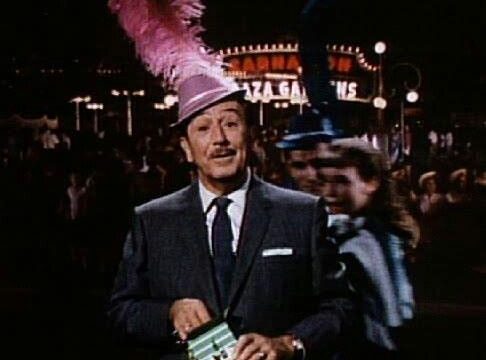Walt Disney was not, for the most part, a great creator. People are shocked by that opinion, especially from someone who’s been writing a Disney column for [checks] five years yesterday! Happy anniversary to this column, and also let’s go ahead and justify that stance while also explaining exactly why he’s as influential a person as he is as well. Because he is, and he deserves to be remembered, but what Walt did was not create. Walt hustled. Walt had a knack for assigning the right people to projects. And above all, Walt promoted.
Walt himself didn’t even really create Mickey Mouse. Ub Iwerks did. He came up with the idea of the mouse, but Iwerks did the character design. If you go further back, yes, there are some examples of Walt’s doing actual creative work, but rapidly, it became clear that his genius was in personnel and marketing. Iwerks was a prime example of that, and the history of the company has pretty well erased that—which shows the marketing as well. The last time Walt ever said he could do the creative end of things better than the people who made it, he directed one of the studio’s worst shorts; even he knew that.
Another amazing example of Walt’s promotion is the very idea of the Disney TV show. The ’50s, granted, were an upswing in Disney’s finances—the studio hasn’t always been the giant media behemoth we think of—but he still managed to get a network to give him a weekly show that, on a regular basis, was simply a commercial for another one of his products. The shows were all themed to lands at Disneyland. Episodes regularly talked about the park. They’d show behind-the-scenes bits about theatrical release movies that hadn’t been finished yet.
Heck, even the image people have of Walt is showmanship and promotion. Walt Disney on the show is friendly and genial. He’s essentially everyone’s uncle. He talks directly to us, telling us things that interest him because he thinks they’ll interest us. He shows some of the other people at the studio, doing their assorted jobs. He teaches us about the Imagineers. It’s great, but the focus is still mostly on Walt as the face of the studio.
Behind the scenes, Walt was a man deeply scarred by what sounds like an emotionally abusive father. He wanted complete loyalty and treated his animators’ wanting to eat and sleep indoors on what he paid them as a personal attack. I’m not entirely sure why he’s become everyone’s go-to example of an antisemitic public figure of the mid twentieth century, given how much milder he was than, say, Henry Ford. But despite the surprising diversity of the studio, he did have a lot of the prejudices of a man of his time and place. He was a lot darker and a lot more complicated than he wanted anyone to know.
Walt hired well. Many, many of the people I’ve written about for my two weekend columns worked for Walt at least once or twice; some of them spent entire careers at the studio. But the main reason you know who Walt Disney was, and the main reason there’s enough assorted Disney content to get five years of columns and still have tons of things still to talk about, is that Walt knew how to promote. One of the things he promoted was himself, tying his image to that of his studio in a way that, decades after his death, is hard to untangle. Though you’d think they were trying, given how seldom he appears in anything actually on Disney+.
Give me a fifth anniversary present by contributing to my Patreon or Ko-fi!

